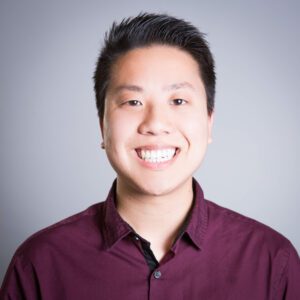Nanotechnology at Northwestern
Meet Derek Wong, a graduate student in the Jewett Lab
March 24, 2022
Derek Wong is a graduate student in the Jewett Lab, which is reconceptualizing the way complex biological systems are engineered for compelling applications in medicine, materials, and energy.

Where are you originally from?
I’m from Danville, CA, in the suburbs of San Francisco.
Where did you complete your undergraduate degree?
I completed my undergraduate degree in bioengineering at the University of California, San Diego.
When did you first become interested in chemical and biological engineering?
Throughout middle and high school, I found that I gravitated towards math and science courses. My interest in chemical and biological engineering specifically started in high school when I participated in a biotechnology summer research program. I was amazed by our ability to manipulate cells to perform non-native functions that we as engineers are interested in. Throughout undergrad, I continued exploring different opportunities in engineering, particularly with respect to developing or improving pharmaceuticals and therapeutics.
How do you explain what you study to non-scientists?
Antibiotic resistance is a major health crisis, resulting in more deaths globally than both HIV and malaria. I am working on discovering and characterizing a class of molecules called lasso peptides, which are natively produced by bacteria and have demonstrated antibacterial activity.
Our collaborators in the Balskus Lab at the Broad Institute have analyzed thousands of bacterial genomes to identify potential genes encoding the components required to produce previously undiscovered lasso peptides. Once identified, these genetic sequences were provided to us for use in our cell-free expression systems.
Cell-free expressions systems, a specialty of the Jewett Lab, utilize cell extracts as opposed to living organisms to harness the transcription and translation machinery of bacteria to produce desired proteins. I am using cell-free systems to produce the computationally predicted lasso peptide biosynthetic proteins. After expressing the individual proteins, I then assemble the different predicted biosynthetic pathways and analyze for successful production of a mature lasso peptide. Ultimately, we hope to assay these molecules for activity against gram-negative bacteria to identify novel antibiotic-like lasso peptides.
What inspired you to focus on novel antibiotics? What potential do you see in that area?
To effectively combat antibiotic resistance, it is important that the medical community identify, characterize, and develop molecules with diverse structures and novel mechanisms of action. While several lasso peptides have demonstrated antibacterial activity, none have reached the clinical setting. Accessing, assaying, and developing larger libraries of lasso peptides have the potential of expanding the types of molecules accessible to the medical community for combating bacterial infections.
What has been a highlight of your time at Northwestern?
Working and collaborating with so many other motivated and talented scientists has been a major highlight of my time at Northwestern. Whether through conversations with my coworkers in the lab or meetings with collaborators to discuss our most recent updates, I am constantly impressed by the amount of intellectual curiosity and innovation I am surrounded by. Being part of such a vibrant research community has pushed me to be a better scientist and continues to inspire me to work harder.
What has been the most challenging aspect of your work or your time at Northwestern?
One of the most difficult aspects of discovery-based research is the number of experiments it can take to understand a previously uncharacterized system or to establish best assay conditions for further studies.
At the beginning of this project, we had to go through many different iterations of experimental workflows before we even began to see slight evidence of enzymatic activity. Working through repeated “failed” experiments week after week was challenging from both a mental and emotional standpoint. However, I have learned that challenging research is important because it means that the work is pushing the envelope of what is known.
Can you tell me about your experiences either being mentored or mentoring others?
My mentor, Dr. Michael Jewett, has been a constant source of support throughout my time in his lab. Throughout the pandemic, he has always been supportive and understanding as we navigated through difficult and stressful times. With regards to research, he always encourages us to push ourselves to be the best scientists we can be. Through his guidance, I learn and improve each and every day.
I am also grateful for the mentorship of many of my peers in the lab, including Dr. Ashty Karim, Dr. Jon Bogart, Dr. Maria Cabezas, and Katie Warfel.
Recently, I have started mentoring an undergraduate student in the laboratory. It has been an awesome experience so far as I continue to improve on my scientific communication skills and ability to guide others through scientific problem solving.
What are your hobbies outside of the lab?
Outside of the lab, I enjoy watching tennis matches, cooking, and trying new restaurants in Chicago. Recently, I’ve started getting back into running, which has been a great way to relief stress and enjoy the outdoors.